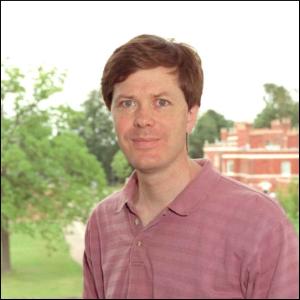Richard Durbin, Deputy Director of the Wellcome Trust Sanger Institute, Elected to the Royal Society

The Royal Society announced today (28 May 2004) the election of 44 new Fellows – experts in the fields of science, engineering and technology. The Royal Society counts amongst its members 65 Nobel Laureates.
Dr Durbin is a leading expert in bioinformatics – using computers and software to understand biological process. Ten years ago, the largest available genome sequences were viruses with a few hundred thousand DNA bases. Today, we have many genomes – including human – that contain billions of bases. Sophisticated computational tools are needed to help researchers make use of all this information. A leading example is the Ensembl genome browser, developed by Durbin’s team, which receives approaching 1 million hits each week.
Dr Durbin has also led teams developing the next generation of bioinformatics tools – resources to understand and classify protein structure. Biological effects of changes in DNA sequence are exerted through change in protein properties: making sense of protein structures is an essential component of understanding disease.
“It is a great honour to be elected to the Royal Society, whose fellowship includes so many exceptional scientists from the UK and abroad. What I love about science is working together with great people. All my work has been done in collaboration, and I believe my election reflects as much on my colleagues at the Sanger Institute and elsewhere as on myself.”
Dr Richard Durbin Deputy Director of The Wellcome Trust Sanger Institute
Dr Durbin is a graduate in mathematics from Cambridge University and one of the founder members of the Sanger Institute. He has also held carried out research at the Laboratory of Molecular Biology in Cambridge and at Harvard and Stanford Universities in the USA.
“Without bioinformatics – harnessing the power of computers to understand biology – genomic science would not be the force it is today to drive new biomedical development. Richard has led the invention of computer tools that allow us to manage the massive amounts of information that institutions such as the Sanger Institute produce.
“Richard’s vision of what might be possible in unlocking genomes has underpinned many of our achievements. It is typical of him that he acknowledges the contributions of his colleagues.”
Professor Allan Bradley FRS, Director of the Sanger Institute
The Wellcome Trust Sanger Institute has played a key role in sequencing of the human genome and ensuring the results are freely available to all in the public domain. It also leads projects to sequence and analyse genomes of other organisms. These resources are key in bringing new biomedical developments.
Under plans developed in 2002, new areas of research complement the existing skills in genomics to accelerate translation of genomic information into new biological knowledge and medical treatments. The new postgenomic research demands more sophisticated software and more efficient compute resources.
More information
- The Royal Society is the world’s oldest scientific academy in continuous existence, and has been at the forefront of enquiry and discovery since its foundation in 1660. The backbone of the Society is its Fellowship of the most eminent scientists of the day, elected by peer review for life and entitled to use FRS after their name. There are currently more than 65 Nobel Laureates amongst the Society’s approximately 1300 Fellows and Foreign Members. Throughout its history, the Society has promoted excellence in science through its Fellowship, which has included Isaac Newton, Charles Darwin, Ernest Rutherford, Albert Einstein, Dorothy Hodgkin, Francis Crick, James Watson and Stephen Hawking.
The Society is independent of government, as it has been throughout its existence, by virtue of its Royal Charters. In 1663, “The Royal Society of London for the Improvement of Natural Knowledge” was granted its Arms and adopted the motto Nullius in verba, an expression of its enduring commitment to empirical evidence as the basis of knowledge about the natural world.
- Dr Durbin’s citation reads: Durbin is distinguished for his powerful contribution to computational biology. In particular, he played a leading role in establishing the new field of bioinformatics. This allows the handling of biological data on an unprecedented scale, enabling genomics to prosper. He led the analysis of the C. elegans genome, and with Thierry-Mieg developed the database software ACEDB. In the international human genome project he led the analysis of protein coding genes. He has introduced key computational tools in software and data handling, and developed the use of powerful and rigorous probabilistic methods for DNA and protein sequence, such as hidden Markov models. Based on these methods, his Pfam database is widely used for the identification of domains in new protein sequences.
Websites
- Sanger Institute – https://www.sanger.ac.uk/
- Ensembl – http://www.ensembl.org/
- AceDB – http://www.acedb.org/
- Pfam – Pfam – https://www.sanger.ac.uk/science/tools/pfam/
Selected websites
The Wellcome Trust Sanger Institute
The Wellcome Trust Sanger Institute, which receives the majority of its funding from the Wellcome Trust, was founded in 1992. The Institute is responsible for the completion of the sequence of approximately one-third of the human genome as well as genomes of model organisms and more than 90 pathogen genomes. In October 2006, new funding was awarded by the Wellcome Trust to exploit the wealth of genome data now available to answer important questions about health and disease.
The Wellcome Trust and Its Founder
The Wellcome Trust is the most diverse biomedical research charity in the world, spending about £450 million every year both in the UK and internationally to support and promote research that will improve the health of humans and animals. The Trust was established under the will of Sir Henry Wellcome, and is funded from a private endowment, which is managed with long-term stability and growth in mind.


